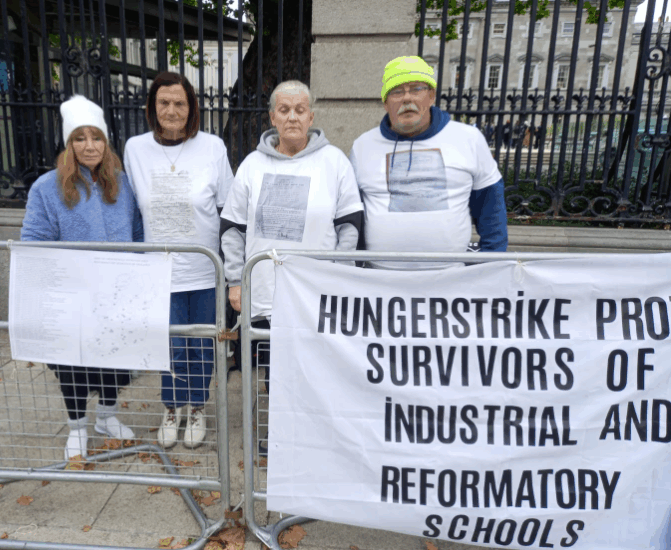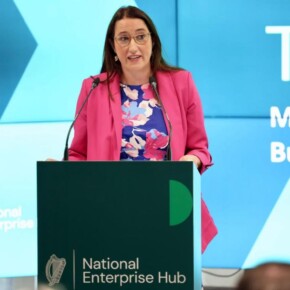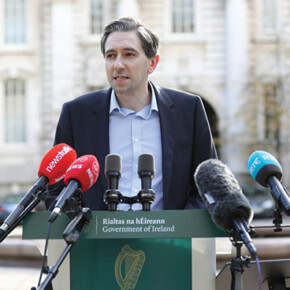Industrial school survivors stage hunger strike after being “let down” by government
Mike Finnerty 08 Oct 2025
Survivors of industrial schools are into their second week of a hunger strike outside Leinster House after government promises were not kept.
Mary Donovan and Miriam Owens are among those who have travelled up from Limerick and Kerry to get the government’s attention and force their hand on the issue.
Per them, any survivor of abuse at an industrial school is entitled to an HAA Card, a medical card which is provided to people who fall under the Health Amendment Act.
Originally created as a response to the contaminated blood scandal of the 1990s, the scheme, in theory, entitles survivors to avail of a state contributory pension and a health card, and the survivors of industrial schools believe they are entitled to the card.
In 1999, then-Taoiseach Bertie Ahern issued an official state apology to the survivors of the schools, saying “on behalf of the state and all the citizens of the state, the government wishes to make a sincere and long overdue apology to the victims of childhood abuse for our collective failure to intervene, to detect their pain and to come to their rescue.”
The state apology came in the wake of the acclaimed television documentary States Of Fear, which helped bring the scandal to the public consciousness.
Industrial school survivors Donovan and Owens have been taking part in a hunger strike for the last two weeks, saying it is a measure of last resort, and they said they are trying to force the government’s hand on the issue.
Minister for Justice Jim O’Callaghan said, “these people have gone to dangerous efforts to make their point. It is a point that they are making admirably, but I would urge them to not make it through a hunger strike.”
Per the survivors, they were left with no other choice, saying they felt “let down” after years of broken government promises on the issue.
Donovan said she was “tired of false promises,” and that a hunger strike was the best way of getting their attention.
Donovan has been part of survivors panels and has worked with the government in the past to draft legislation, but she said any restitution that was promised to them all those years ago has been sanded down by consecutive governments.
“They have insulted survivors,” she said.
“I wasn’t asked to be taken from our family home; we are still criminalised because of something we had no control over.”
Donovan asserted, “they (the Department of Education) want us to die and go away.”
Speaking in the Dáil on Wednesday, Minister O’Callaghan said the protest is “a point they are making admirably, but I urge them not to make it through hunger strike.”
The Minister said that survivors of industrial schools and reformatories will be treated “consistently” by the government and said “it is acknowledged that there have been calls for the state to provide this pension payment to survivors and that payments of this type are made to survivors of the Magdalen laundries.”
“However, it should be noted that those payments reflect the very particular circumstances involved, where the women in the Magdalene laundries were engaged in commercial work as adults, in some cases for many years, without appropriate contributions.”
In a letter to the survivors, seen by Southside People, Minister Helen McEntee wrote, “I would like to once again express my concern for your health and wellbeing and to respectfully request that you reconsider your decision, in the interests of safeguarding your physical and mental health.”
“As I outlined to you on Monday, the government decided in June 2023 to ensure the provision of a package of supports to survivors of abuse in residential institutions, including health, education and advocacy supports. This decision followed detailed consideration of the report of the Consultative Forum, which was led by survivors of institutional abuse, and other reports and submissions, and engagement with other government departments”
“The legislation which was recently passed by the Oireachtas gives effect to this
Government decision. I understand that you have concerns in relation to the legislation and acknowledge that you are seeking the provision of additional support. Concerns were taken into account in the legislation to the fullest extent possible and were debated during its passage through the Oireachtas.”
“For these reasons, I am not in a position to revisit this legislation,” she said, indicating that the government’s position is that survivors of industrial schools are not entitled to HAA cards or a state contributory pension.
Per Owens, Minister McEntee’s attitude is “typical” of the government’s non-commital stance towards them and that their requests have been repeatedly watered down over the years to the point of nothingness.
“They are treating us like second-class citizens. We have been treated like dirt by two consecutive governments.”
Owens said that Minister Norma Foley, the previous Minister for Education, was “out of her depth” in dealing with the issue, and asserted that Minister McEntee was “callous” in her treatment of them since she took office in January.
“To the government, it’s almost like we have to prove to them, on a points system, how much we were abused and they just tick a box.”
She argued that “no money in the world” can make up for what her and other industrial school survivors endured, but she said it was more of a “moral” imperative for the government to make it up to survivors.
Donovan added “I don’t think we are asking the world here; it’s not a lot to ask for.”
“It is a national disgrace, how we are being treated. They are not fit to run the country.”
Both Donovan and Owens said they took part in the Consultative Forum which was the basis for the government’s report in June 2023, with both of them saying the results of that forum resulted in their previous promises of state pension and an HAA card being stripped away despite previous government promises.
In McEntee’s correspondence, she wrote, “I would like to assure you that it is not my intention, or of the government or my department, to bury the past or prevent you from telling your stories.”
Minister O’Callaghan said in the Dáil, “it is unfair to say that the state does not face up to its financial responsibilities arising from terrible events that happened in the past; it clearly has done,” he said, pointing to the redress scheme for victims of the Magadnene Laundries.”
Speaking to Southside People on Friday morning, Donovan confirmed the group were offered a hotel by the Department of Education amid the approaching Storm Amy.
“We don’t want a hotel; we want what we are owed,” she said.
“The way we are being treated, and have been treated, is an insult.”











